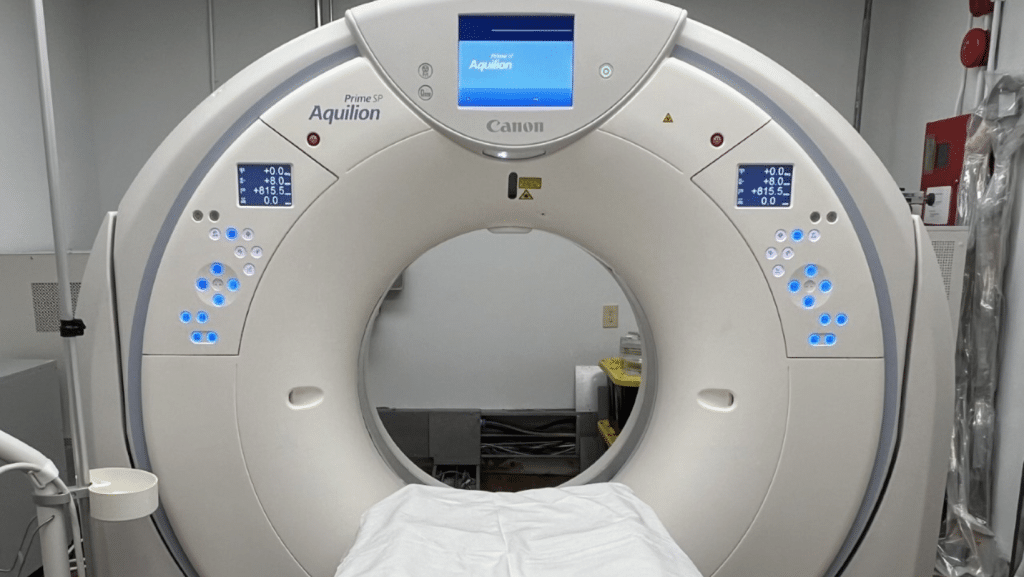What is a Coronary Calcium Scoring CT Scan?
A Coronary Calcium Scoring CT Scan is a non-invasive way of obtaining information about the presence, location, and extent of calcified plaque in the coronary arteries. Because calcium is a marker of CAD, the amount of calcium detected on a cardiac CT scan is a helpful prognostic tool. The findings on cardiac CT scans are expressed as a calcium score. Another name for this test is Coronary Artery Calcium Scoring.
What are some common uses of the procedure?
The goal of a Coronary Calcium Scoring CT Scan is to determine if CAD is present and to what extent, even if there are no symptoms. It is a screening study that may be recommended by a physician for patients with risk factors for CAD, but no clinical symptoms.
What is Coronary Artery Disease (CAD)?
Cardiovascular disease is the leading cause of death worldwide, with Coronary Artery Disease (CAD) accounting for half of all such deaths. Calcified plaque results when there is a buildup of fat and other substances under the inner layer of the artery. This material can calcify, which signals the presence of Atherosclerosis, a disease of the vessel wall, also called CAD. People with this disease have an increased risk of heart attacks. In addition, over time the progression of plaque buildup (CAD) can narrow the arteries or even close off blood flow to the heart. The result may be chest pain, sometimes called “angina”, or a heart attack.
The major risk factors for CAD are:
- High blood cholesterol levels
- Family history of heart attacks
- Diabetes
- High blood pressure
- Cigarette smoking
- Overweight or obese
- Physical inactivity
What are the Benefits vs. Risks of having a Coronary Calcium Scoring CT Scan?
Benefits:
- Convenient and noninvasive way of evaluating whether you may be at increased risk for a heart attack.
- Takes less than 20 minutes, causes no pain, and does not require the injection of contrast.
- You can return to normal activities immediately afterward.
- No radiation remains in the patient’s body after a CT exam.
- The x-rays used for CT scanning should have no side effects.
Risks:
- There is always a slight chance of cancer from excessive radiation exposure. However, the benefit of an accurate diagnosis far outweighs the risks involved with CT scanning.
- Women who are pregnant or may be pregnant should tell their doctor. CT scans are not generally recommended for pregnant women unless medically necessary because of potential risk to the unborn baby.
- A high heart rate may interfere with the image quality of the test.
How do I Prepare for a Coronary Calcium Scoring CT Scan?
You should continue to take your usual medications and do not smoke or use caffeine for a few hours before the test. Wear comfortable, loose-fitting clothing, or you may be asked to change into a medical gown. Do not wear jewelry around your neck or near your chest.
What can I expect during a Coronary Calcium Scoring CT Scan?
Before the scan begins, sticky patches called electrodes are placed on your chest and sometimes your arms or legs. They will then be attached to an electrocardiograph (ECG) machine that records the electrical activity of the heart. This makes it possible to record CT scans when the heart is not actively contracting.
The scan is done using a CT scanner. You lie on your back on a movable table, which slides into a large machine shaped like a tube. Your head is outside the scanner the whole time.
You will need to stay still while the pictures are taken, and you will be asked to hold your breath for a few seconds. The healthcare professional doing the test can see and talk to you the entire time. The test takes about 10-15 minutes.
How do I get my results and what do they mean?
A radiologist, a doctor specially trained to supervise and interpret radiology exams, will analyze the images. The radiologist will send an official report to the doctor who ordered the exam.
Coronary Calcium Scan results are given as a number. The number is called the Agatston score. The score is the total area of calcium deposits and the density of the calcium. When calcium is present, the higher the score, the higher the risk of heart disease.
- A score of zero means no calcium is seen in the heart. It suggests a low chance of developing a heart attack in the future.
- A score of 100-300 means moderate plaque deposits. It’s associated with a relatively high risk of a heart attack or other heart disease over the next 3-5 years.
- A score greater than 300 is a sign of more extensive disease and a higher heart attack risk.
How do I schedule my Coronary Calcium Scoring CT Scan?
Ask your healthcare provider if a Coronary Calcium Scoring Scan is right for you! Once an order for the scan has been obtained, contact our Radiology Department at for assistance in scheduling your scan. Not all health insurance plans cover Coronary Calcium Scoring CT Scans but for a low cost of $60 out-of-pocket, we can perform your scan and provide your physician with same-day results!
A coronary calcium scan is not recommended as a general screening test for those known to be at risk for heart attacks. It also isn’t suggested if you have had a heart attack, a heart stent, or coronary bypass surgery. CAD, especially in people below 50 years of age can present without calcium (non-calcified plaque) and may not be detected by this exam.

